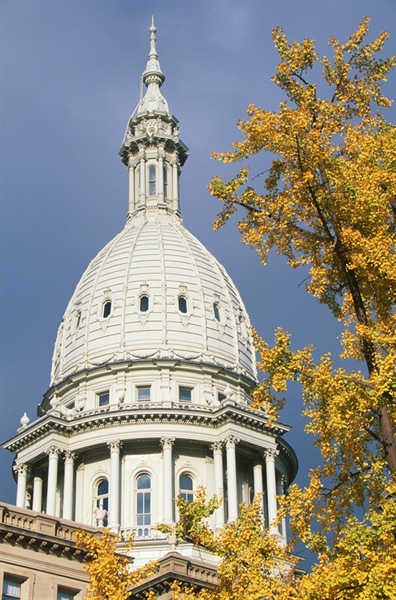
Justice Richard Bernstein told Attorney General Bill Schuette’s representative at Wednesday’s Michigan Supreme Court (MSC) hearing that the AG’s stance against allowing a redistricting reform ballot proposal on the Nov. 6 ballot is “so against the people.”
Also, Justices Beth Clement and Kurtis Wilder — the two GOP-appointed justices facing election this fall — were silent during the court’s special session to determine the fate of Voters Not Politicians (VNP), which hands the current legislatively drawn redistricting process to an independent commission.
Bernstein and Justice Bridget McCormack are the two Democratic-nominated justices on the seven-member court, and both had tough questions for state Solicitor General Aaron
“Your position to me is quite startling, and is quite concerning,” Bernstein told Lindstrom. “And the reason that it’s startling to me is
“It just surprises me that your office would take such a stand that would be so against the people,” Bernstein said, who also accused Lindstrom of not having “faith in the people.”
Later, Lindstrom was laying out his argument that there are distinct ways to change the constitution, including people calling a constitutional convention, but Bernstein jumped in and said, “Let’s kind of get real here: How are people going to call a constitutional convention? Seriously . . . are you really equating that to a ballot initiative?”
Before that, Lindstrom was less than a minute into his time before McCormack interrupted to challenge Lindstrom’s assertion that the VNP constitutional amendment was making a fundamental change in the structure of government by altering the separation of powers, checks and balances, and the ability to elect those who exercise legislative power, he argued.
“Why does the constitution give the seven of us a judicial veto over something that the people have decided they want to vote on?” McCormack asked, who argued what is considered fundamental is in the eye of the beholder.
“Why don’t we get the court out of this business. Let the people decide,” she said.
Meanwhile, Republican-nominated Justice David Viviano repeatedly questioned Peter Ellsworth, who argued against VNP for Citizens Protecting Michigan’s Constitution (CPMC), which is bringing the legal suit against VNP.
Viviano challenged Ellsworth to present any case that had a binding precedent on the court for this issue. Viviano said though the case Ellsworth suggested is “persuasive,” he wasn’t convinced it was binding.
Ellsworth said VNP “could have affected the change they wanted without disturbing the constitution that they’re disturbing. ” He also said Michigan residents do not have a right to vote on an issue that is flawed.
Instead, Ellsworth said the “amendment has to be limited in detail that people can digest without reading seven and
McCormack at one point made a comment about, “crushing the little people,” which Ellsworth dismissed afterward, saying, “This is not an attempt to crush the little people and I think that was a comment was just made in jest.”
But VNP attorney Graham Crabtree said afterward, yes, “This is an attempt to crush the little people. These plaintiffs simply don’t want this on the ballot because they’re afraid it will pass and if it passes that will eliminate an unfair advantage that they are currently enjoying under the current system.”
Crabtree faced most of his questions during the oral arguments from Chief Justice Stephen Markman, another GOP-nominated justice.
Markman at one point asked Crabtree if it was fair to characterize the VNP proposal’s single subject as to “modify the separation of powers of our constitution so that we can have a totally independent and checks-and-balances free institution making decisions concerning the . . . redistricting of legislative districts in Michigan.”
The chief justice also described the
CPMC sought leave to appeal to the state’s highest court after the state Court of Appeals allowed the VNP proposal to be certified by the Board of State Canvassers (BSC).
The MSC asked both parties to address if the VNP proposal was considered a constitutional amendment or a general revision to the constitution. The CPMC is arguing it is a general revision and cannot be allowed on the ballot.
Clement and Wilder are both endorsed by the Michigan Chamber of Commerce in their re-election bids. The Michigan Chamber Litigation Center is funding CPMC.
Two weeks ago Clement voluntarily disclosed her campaign treasurer is married to an attorney – Eric Doster — who is involved with the CPMC legal team, but she opted not to recuse herself.
The VNP legal team opted to not ask for a recusal after asking further questions on the Clement connection. VNP Executive Director Katie Fahey said she had no regrets passing up the recusal request, saying she believes “they heard the case fairly.”
“We fully expect the Supreme Court to side with the law and the 425,000 Michigan voters who signed to get our proposal on the ballot, instead of the special interests that will do whatever they can to maintain the status quo,” Fahey said in a statement.
VNP supporters rallied outside the Hall of Justice during the oral arguments, urging the MSC to let the public vote on the constitutional amendment. They ended their time singing a rendition of “Battle Hymn of the Republic” with new lyrics that went in part, “Michiganders, Michiganders! Time to end the gerrymanders.”
The MSC gave no indication when it would make a decision, but a representative for the Secretary of State’s office asked for a decision in early August around the primary to allow the state time to craft ballot proposal language ahead of an early September deadline to finalize what’s going to be on the ballot, provided VNP is cleared to move forward by the court.